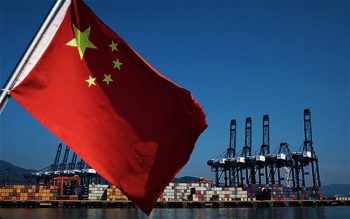
The Deputy Director General, African Affairs of the Ministry of Foreign Affairs, Dai Bing has said that Africa will play a vital role in the upcoming Maritime Silk Road Initiative at the upcoming Belt & Road Summit in Beijing, China next month.
This he highlighted recently, during a meeting with the China Africa Press Centre (CAPC).
“Next month China will host the Belt & Road Summit. Africa will be invited as a vital participant of the Maritime Silk Road,” he said.
The Maritime Silk Road Initiative is another project alongside the Belt & Road Initiative. The project will link China through sea routes to countries and cities across South Eastern and Southern Asia, Europe and Africa.
China’s cooperation with Africa is further strengthened by the cooperations established as a result of the Forum on China Africa Cooperation (FOCAC).
“Chinese investments in Africa has been developing rapidly. FOCAC, is the latest driver of bilateral relations between Africa & China,” Dai said, mentioning that the cooperations was for the benefit of the two parties. This he expressed was necessary as China does not pursue unilateral interests in its cooperations with Africa.
China is poised to assist Africa through ten cooperation projects to support industrialisation, agricultural modernisation, infrastructure, construction, human development among others.
“These areas are in line with the development of Africa. We proposed the ten cooperation projects primarily to help Africa crack three hard nuts. Namely; Lack of infrastructure, talents and funding,” he noted adding that China was ready to help Africa build a system that is self-reliant and sustainable.
Similarly, Dai averred that the 60 billion US Dollar appropriation funds to assist Africa is not entirely ‘a no strings attached’ funding. The fund is however composed of three parts. The first 5 billion US dollars is of assistance, no strings attached, consisting of interest free loans intended to improve livelihood in Africa.
Secondly, the 35 billion is for preferential loans given to Africa to build infrastructure, for projects with positive economic and social benefits. And then the 20 billion US dollars is intended to facilitate Sino-Africa funds and capacity building of Small & Medium Enterprises in Africa.
In terms of investments, the Deputy Director General mentioned that there were presently 300 million dollars of Chinese investment in Africa, and the country would further invest 100 billion dollars on the continent. “Our relations has reached an escalated stage,” he confirmed.
As regards its international policies directed towards Africa, he stressed, “We will not interfere in personal affairs of your countries. We will never impose our policies on your country. Our bilateral relations is founded on principles of non-interference, no political strings attached,” he said.
However what China would like to see, is more of its investments in Africa. As such, the Deputy Director General called for more preferential policies, favourable environment, common community, which would be a solid foundation and cornerstone through which a mutual relationship can be further strengthened.
Challenges currently faced by China as it invests in Africa include; Electricity, water, communications, railways, highways, which are currently in a backward stage, and without the right infrastructure to maintain them.
Also a problem is the discontinuation of policies which comes with a change in leadership. This results in inconsistencies or outright stoppage of some development plans. “Regime change should not affect our activities,” he said.
Dai also mentioned terrorism as a problem in Africa. “Domestic insecurity and crimes, piracy will damage our cooperation,” he said.
In a similar development, Dai revealed that China pledges to train 30,000 individuals from Africa in areas to include agriculture and trade. The Chinese government also intends to build four universities to help develop transportation in Africa.
